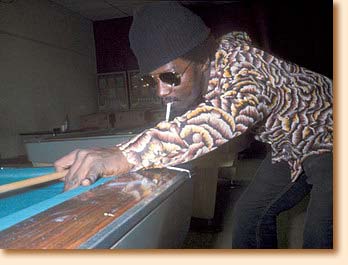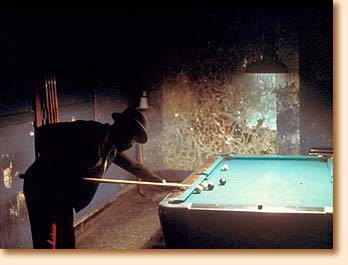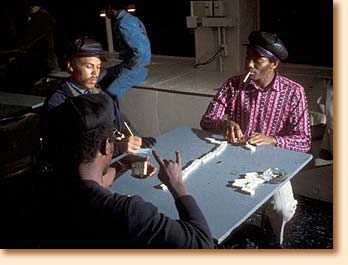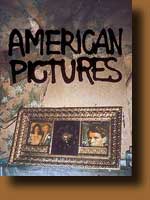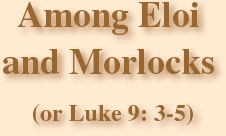
Book 14, pages 250-253
In North Carolina
It was around eleven o'clock and completely dark when I got to the place. There was the usual crowd of half-criminal types outside: the hustlers. They often look mean and dangerous in their sunglasses, but they are not that bad if you treat them right. I really love them, because it is such a challenge for me to find the human being behind the sunglasses. It's either win or lose; if you make a wrong move it can mean death. Like all criminals, they are actually extremely timid and therefore react spontaneously and nervously. I use as a rule of thumb that the darker their sunglasses, the more afraid they are of me and of each other. But as soon as you gain their trust and the sunglasses are removed over a glass of beer or a joint, they show themselves to be fantastic people and will do anything for you. That's why I always seek them out first when I come into a new town since they have lots of contacts. I am always completely honest with them and don't pretend to be anything but what I am, never trying, for example, to imitate their language or to use the common white sentimentality about "we are brothers" and all that crap they have heard so often from whites. One must remember how paranoid they are and that they have no faith in whites in general, or their own people, or themselves. They have been trampled on all their lives and that oppression can not be overcome through any phony "brother" talk. But by speaking absolutely honestly you can show them in various ways who you really are, and what you want, you can overcome their suspicion. They need to know who they are dealing with. It is, for instance, this strong desire that makes many blacks prefer the Southern racist over the Northern liberal, for with the racist they know where they stand and can respect him for his honesty, while the liberal always says one thing and does another. With my pictures and my detailed descriptions of what I have done in other ghettos, it is usually not difficult to convince them of my identity (whenever I know myself what my identity is). They are never totally convinced that I am not an undercover cop, yet they almost always take the chance. Every person has a need to be human in this social system and there is always a risk involved in that. If you let the mask fall, you risk being hurt. Both the capitalist and the criminal are in their everyday life so strongly deformed by the roles dictated for them by the system that they have an unspeakable urge toward human kindness. This urge they have a chance to express with the vagabond, who stands completely outside the system. In order to get something to eat or a place to stay, the vagabond must always talk to the "good" (the humane) in the capitalist or the criminal and when he first realizes that this is always possible, then he can no longer condemn them as "capitalists" or "criminals," but concludes that they all have possibilities for acting in accordance with a system other than the one that usually directs them. Thus, the vagabond instead begins to condemn the system he always has to struggle against in order to survive. Therefore, even the worst criminals usually take that chance with me, and gradually, as the worst distrust subsides, and some beers go down, we can fall quite in love with each other in mutual admiration of the roles we usually play. They are always interested in what I have learned from other criminals, and the more "hustles" I describe, the closer we are bound to each other. But in the exchange of ways to "cop" (the word that covers everything the criminal needs, whether it is a bag of heroin, a car, a gun, a woman, or wine), I always emphasize putting it in a political context. Often the events we are exposed to in the course of such a night become increasingly criminal. I know that in order to get a place to sleep toward morning, I have to convince them that I am with them all the way. So the first night in a new town I usually don't get much sleep; but in this way I gain a foothold in other social circles of the ghetto, since the criminal's sisters, brothers, parents, and friends are not necessarily criminals themselves.
But this night in Wilmington something went wrong. I received the same hostile
vibrations from the people outside the bar as I always get, but there was no
possibility of breaking the ice. No matter what I said, it didn't get through. They
started making threats and said, "We're militants, get your ass out of here or
you're a dead man." I was so stunned that my survival philosophy didn't work
that I went all weak in the knees. I felt suddenly that I had no control over
events and gave up. I walked a bit farther down the main street, but to get
back to the car without passing them again, I turned off to the right through
an unlit "project" - as these municipal poorhouses are called. But just as I
turned in there, I noticed that they had started after me. Apparently they
perceived this to be their territory. I made the mistake of running further in
in order to hide from them. I hid under a bush and saw that they were suddenly
all over, about a dozen of them. I started shaking, I was so shocked at this
development. I realized that I didn't stand a chance and ran out into a dark
alley to surrender. I was immediately surrounded, knives and guns pointing at
me from all sides. From that moment I don't remember exactly what happened,
just that I began rattling off a lot of words. I said, among other things,
something like that they should wait just two minutes, look at my pictures and
hear why I was there, and if they didn't like it, they could kill me then. I
don't know if that was what tipped the balance, but after much yelling and
screaming about what they should do with me, what finally happened was that
they led me out to the main street with guns and knives in my hack. I was
shaking at the thought that someone might pull the trigger by accident. They
said that I should walk straight up the road until I was out of town. In order
to get back to town, I now had to walk two miles out and then two miles back on
a parallel street. I thought about calling a taxi or the police, but gave up
the idea. I had no money for a taxi and felt it was wrong to use the police. If
I was seen with the cops, they would really be convinced that I was not on
their side. So in the darkness I ran from tree to tree down the parallel street
to avoid being seen from cars, as it could be my attackers in the cars. The
scene was exactly like the movie "In the Heat of the Night" - only racially
reversed.
I got back without a scratch and roared out of town at full speed. I had had
enough of staying in the ghetto for that night. I have since tried to analyze
what I did wrong that evening. There is no doubt that I failed because I was dishonest with the criminals. I pretended to be a poor vagabond who needed a
place to sleep, but in fact I was not poor, as the car was hidden nearby and I
knew all along that if necessary I could sleep in the car that night. I had not
been completely honest with them and therefore could not make the positive
impression that would open them up. I had made the same mistake as the feudal
lord who comes riding along in his comfortable coach with shining lanterns and
thus carries with him his own light and his own darkness. He enjoys his
security and the light which is cast on the immediate surroundings, but he does
not understand that the strong glare dazzles him and prevents him from seeing
the stars, which the poor peasant wandering on foot and without a lamp is able
to see perfectly clearly and to use as a guide.
I then drove out to a white community nearby. After this grim experience I
began to feel that something fantastic would happen that night. That's how it
almost always goes when you travel: when you are the most down, you will be the
highest up right afterward. So fatalistic have I become on this point that when two weeks earlier 1 stood in shirt
sleeves freezing in a snowstorm for hours on a back road in West Virginia,
unable to get a lift, I became completely convinced that something good would
come out of' it, and sure enough, that same evening I landed at the
Rockefellers'. If as a vagabond you are not possessed of this fatalism you are
lost, for just by virtue of your conviction you are able to communicate such
strong positive energy that you yourself are actually helping to create a
favorable situation. Anyhow, when I stepped into a bar on Wrightsville Beach
that night, I was not totally taken by surprise by what happened. I had been
standing there alone for some time when a very sweet young woman came over and
pulled my beard and wanted to know who I was. Then things happened pretty fast
and she began pouring a lot of wine into me. When, as a vagabond, you stand
completely alone in the world, you are very weak in such situations and fall in
love incredibly easily. But when only an hour earlier you have been closer to
death than ever before, then this falling in love takes on such violent dimensions that it becomes totally overwhelming.
Any human being who had shown me warmth that night, I would have bound myself
to forever. One of the first things she asked me was if I had a place to live.
When I said no, she immediately said that I should move in with her. She would
give me all the money I needed and a gasoline credit card for the car. It
turned out that she belonged to one of America's richest families, who own the
Schlitz brewery. I will never forget that night. Usually I am impotent the
first night with a new woman, but the violent experience was still so much with
me that I was thinking more about that, and therefore everything went as it
should. It was exactly the same as that time in New Orleans when a woman and I
witnessed one of our friends kill another while we played pool, and afterward
went home and made love all night long. Sex and violence are probably very
intimately connected. On the whole, I feel that many of my love affairs in the
U.S.A. have been brought about by a violent experience – or have resulted in
one. My love for this country could be of the same nature. That night we fell
so much in love with each other that she started talking right away about
getting married. When we got married we would receive $50,000, and thereafter
$30,000 a year. "I want to have a child with you," she said. During the first
days f myself was so convinced that I was getting married that I started
writing to all my friends that "now I had finally found the right one."
I was fascinated by her and her upper class nature. She spent money as if it
were water. The first week we spent hundreds of dollars and she had to
telegraph her father in Europe for more money. I enjoyed going to the finest
restaurants, eating lobster and steak, which felt good after several months of
"soul food." But I still insisted on continuing my exploring and drove out in
the car in the daytime to photograph the poverty and hunger in eastern North
Carolina. An expert on geophagy (dirt eating) had told me about the hunger in
the area. During the day I photographed hunger, and at night I gorged myself on
steaks. Every other day I spent with my fiancée on a nearby island, which was
only for rich people. There was a guard on the bridge to prevent blacks and
other poor outcasts from getting out there. We lived in a lovely big villa and
lay on the beach all day loafing. It was here I first began to lose interest in
her, as I was simply bored to death. In the beginning she took a certain
interest in my "hobby," but gradually it became clear that she perceived
blacks as subhuman. I have often fallen in love with Southern racists because
of their exoticism and charming dialect and my own fascination with the person
behind the master/slave relationship, but it slowly dawned on me that you
cannot base a marriage on such a fascination. I began to feel that our child
would be more the product of violence than of love. When I asked what she would
do if we drifted apart, she said, "Don't worry, I've got enough money, I can
get an abortion any time." She was still madly in love with me, but I was
starting to get my feet hack on the ground. So when shortly afterward she had
to travel to the Galapagos Islands to look at turtles and wanted to take me
with her, f at first felt very tempted, but nevertheless said no. It would be
good to get her at a little distance and cool off. She asked me to come hack
for her birthday, which I promised to do.
I hitchhiked a couple of thousand miles to get back on that day and arrived
just around noon and thought she would be happy. But she just lay on her bed
and was totally cold. She had had a good vacation with the turtles, but had
begun to feel that we weren't suited for each other. In the end she had gone to
Ecuador to get an abortion. Now she had no feelings left for me, she said. I
was both deeply hurt and very relieved at the same time, said farewell and went
back into the ghetto in Wilmington to have another try at getting to live
there. I went into the same bar, but this time in the daytime and bought a
round of Schlitz for the people there with the money I had left from my days of
luxury. And this time I succeeded in being accepted and there was chatter and
talk and a warmth without equal. It was at that time that Schlitz started their
new ad campaign with the slogan "Only love is better than Schlitz." Every time
I saw it around the country I thought of Wilmington, and its violent racial
hatred.
Summary of letters
Copyright © 2005 AMERICAN PICTURES; All rights reserved.
